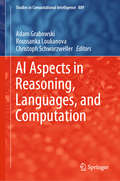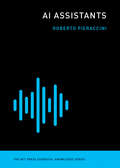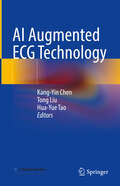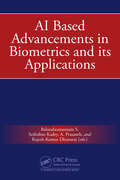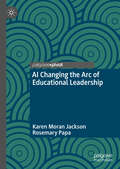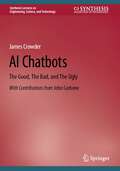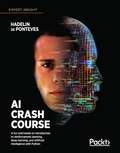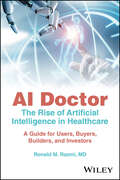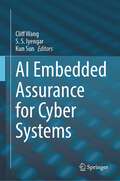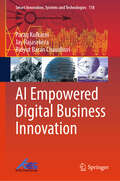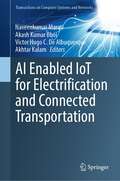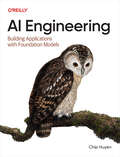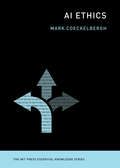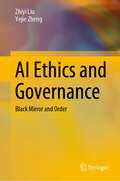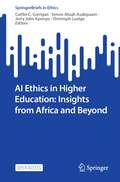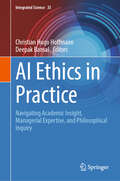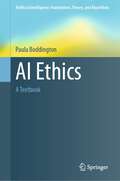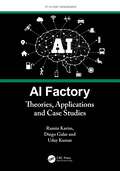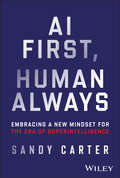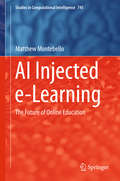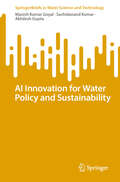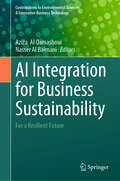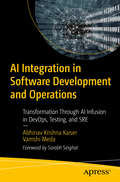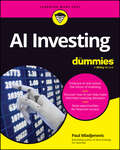- Table View
- List View
AI Aspects in Reasoning, Languages, and Computation (Studies in Computational Intelligence #889)
by Roussanka Loukanova Adam Grabowski Christoph SchwarzwellerThis book builds on decades of research and provides contemporary theoretical foundations for practical applications to intelligent technologies and advances in artificial intelligence (AI). Reflecting the growing realization that computational models of human reasoning and interactions can be improved by integrating heterogeneous information resources and AI techniques, its ultimate goal is to promote integrated computational approaches to intelligent computerized systems. The book covers a range of interrelated topics, in particular, computational reasoning, language, syntax, semantics, memory, and context information. The respective chapters use and develop logically oriented methods and techniques, and the topics selected are from those areas of logic that contribute to AI and provide its mathematical foundations.The intended readership includes researchers working in the areas of traditional logical foundations, and on new approaches to intelligent computational systems.
AI Assistants (The MIT Press Essential Knowledge series)
by Roberto PieracciniAn accessible explanation of the technologies that enable such popular voice-interactive applications as Alexa, Siri, and Google Assistant.Have you talked to a machine lately? Asked Alexa to play a song, asked Siri to call a friend, asked Google Assistant to make a shopping list? This volume in the MIT Press Essential Knowledge series offers a nontechnical and accessible explanation of the technologies that enable these popular devices. Roberto Pieraccini, drawing on more than thirty years of experience at companies including Bell Labs, IBM, and Google, describes the developments in such fields as artificial intelligence, machine learning, speech recognition, and natural language understanding that allow us to outsource tasks to our ubiquitous virtual assistants. Pieraccini describes the software components that enable spoken communication between humans and computers, and explains why it's so difficult to build machines that understand humans. He explains speech recognition technology; problems in extracting meaning from utterances in order to execute a request; language and speech generation; the dialog manager module; and interactions with social assistants and robots. Finally, he considers the next big challenge in the development of virtual assistants: building in more intelligence--enabling them to do more than communicate in natural language and endowing them with the capacity to know us better, predict our needs more accurately, and perform complex tasks with ease.
AI Augmented ECG Technology
by Kang-Yin Chen Tong Liu Hua-Yue TaoThis book mainly focuses on the application of AI technology in the field of ECG, and details the theoretical, practical, and evidence-based aspects of this technology. It extensively reviews the latest research reports, and discusses the application of artificial intelligence in the diagnosis and treatment of cardiovascular diseases. This book focuses on the application of artificial intelligence in the diagnosis and treatment of cardiovascular diseases, and discusses in depth its clinical application in the diagnosis and treatment of coronary heart disease, heart failure, arrhythmia, cardiac pacing, hypertension, myocardial disease, heart valve disease, electrolyte disorders, and other diseases. It not only provides an overview of medical artificial intelligence but also richly demonstrates its clinical practice, which will help cardiovascular doctors, electrocardiogram diagnostic doctors, or medical students to understand the basic theories, applications, and development direction of this field.
AI Based Advancements in Biometrics and its Applications
by Seifedine Kadry Rajesh Kumar Dhanaraj A. Prasanth S BalasubramaniamThis book delves into the history of biometrics, the different systems that have been developed to date, problems that have arisen from these systems, the necessity of AI-based biometrics systems, different AI techniques developed to date (including machine learning, deep learning, natural language processing, and pattern recognition), their potential uses and applications, security and privacy issues in AI-based Biometric systems, current trends in AI-based biometrics, and presents case studies of AI-based biometrics.
AI Changing the Arc of Educational Leadership
by Rosemary Papa Karen Moran JacksonAs artificial intelligence becomes an all-encompassing issue in education and beyond, this book seeks to answer how it will change the arc of educational leadership in K-12 schooling. Educators and leaders serve as the champions and gatekeepers of technology use in schools. They need to consider how AI can change education for the better while keeping in mind cultural, social, and emotional concerns that cannot be isolated from educational settings. Jackson and Papa examine existing literature and include insightful interviews with professionals in AI and education to understand how educators currently perceive and use AI. They also illustrate the similarities and differences in how educators and A.I.ED developers envision AI's present and future.
AI Chatbots: The Good, The Bad, and The Ugly (Synthesis Lectures on Engineering, Science, and Technology)
by James CrowderThis book explores the subject of artificial psychology from the standpoint of how online Chatbots have infiltrated and affected societies and the world in general. The book explores the psychological effects of depending on an online entity for our needs – even if it’s a reminder of scheduled events. The author provides insight into the notion of human-Chatbot exchanges, understanding, and false emotions both from the Chatbot and from the human. He goes on to investigate and discuss the dangers of too much reliance on technology that learns from a variety of sources and how some sources can negatively influence Chatbots, and by doing so, negatively affect people. The book also discusses human-Chatbot interactions and the natural language interface(s) required to respond adequately to humans. Lastly, the author explores the notion of ethical considerations for people, based on their interactions with Chatbots, including information based on cultural differences between different regions of the world.
AI Crash Course: A fun and hands-on introduction to machine learning, reinforcement learning, deep learning, and artificial intelligence with Python
by Hadelin de PontevesIf you want to add AI to your skillset, this book is for you. It doesn’t require data science or machine learning knowledge. Just maths basics (high school level).
AI Doctor: The Rise of Artificial Intelligence in Healthcare - A Guide for Users, Buyers, Builders, and Investors
by Ronald M. RazmiExplores the transformative impact of artificial intelligence (AI) on the healthcare industry AI Doctor: The Rise of Artificial Intelligence in Healthcare provides a timely and authoritative overview of the current impact and future potential of AI technology in healthcare. With a reader-friendly narrative style, this comprehensive guide traces the evolution of AI in healthcare, describes methodological breakthroughs, drivers and barriers of its adoption, discusses use cases across clinical medicine, administration and operations, and life sciences, and examines the business models for the entrepreneurs, investors, and customers. Detailed yet accessible chapters help those in the business and practice of healthcare recognize the remarkable potential of AI in areas such as drug discovery and development, diagnostics, therapeutics, clinical workflows, personalized medicine, early disease prediction, population health management, and healthcare administration and operations. Throughout the text, author Ronald M. Razmi, MD offers valuable insights on harnessing AI to improve health of the world population, develop more efficient business models, accelerate long-term economic growth, and optimize healthcare budgets. Addressing the potential impact of AI on the clinical practice of medicine, the business of healthcare, and opportunities for investors, AI Doctor: The Rise of Artificial Intelligence in Healthcare: Discusses what AI is currently doing in healthcare and its direction in the next decade Examines the development and challenges for medical algorithms Identifies the applications of AI in diagnostics, therapeutics, population health, clinical workflows, administration and operations, discovery and development of new clinical paradigms and more Presents timely and relevant information on rapidly expanding generative AI technologies, such as Chat GPT Describes the analysis that needs to be made by entrepreneurs and investors as they evaluate building or investing in health AI solutions Features a wealth of relatable real-world examples that bring technical concepts to life Explains the role of AI in the development of vaccines, diagnostics, and therapeutics during the COVID-19 pandemic AI Doctor: The Rise of Artificial Intelligence in Healthcare. A Guide for Users, Buyers, Builders, and Investors is a must-read for healthcare professionals, researchers, investors, entrepreneurs, medical and nursing students, and those building or designing systems for the commercial marketplace. The book's non-technical and reader-friendly narrative style also makes it an ideal read for everyone interested in learning about how AI will improve health and healthcare in the coming decades.
AI Embedded Assurance for Cyber Systems
by Cliff Wang S. S. Iyengar Kun SunThe rapid growth and reliance on cyber systems have permeated our society, government, and military which is demonstrated in this book. The authors discuss how AI-powered cyber systems are designed to protect against cyber threats and ensure the security and reliability of digital systems using artificial intelligence (AI) technologies. As AI becomes more integrated into various aspects of our lives, the need for reliable and trustworthy AI systems becomes increasingly important. This book is an introduction to all of the above-mentioned areas in the context of AI Embedded Assurance for Cyber Systems.This book has three themes. First, the AI/ML for digital forensics theme focuses on developing AI and ML powered forensic tools, techniques, software, and hardware. Second, the AI/ML for cyber physical system theme describes that AI/ML plays an enabling role to boost the development of cyber physical systems (CPS), especially in strengthening the security and privacy of CPS. Third, the AI/ML for cyber analysis theme focuses on using AI/ML to analyze tons of data in a timely manner and identify many complex threat patterns. This book is designed for undergraduates, graduate students in computer science and researchers in an interdisciplinary area of cyber forensics and AI embedded security applications. It is also useful for practitioners who would like to adopt AIs to solve cyber security problems.
AI Empowered Digital Business Innovation (Smart Innovation, Systems and Technologies #118)
by Parag Kulkarni Jay Rajasekera Bidyut Baran ChaudhuriDigital business innovation is not simply about using new technologies and upgrading business plans but about upgrading your strategic thinking and embedding AI in the thought process. This book covers digital technologies and the strategic landscape of digital entrepreneurship. It elaborates how AI advances converge to create new learning and business opportunities. It includes digital business innovation technologies, AI strategies for businesses, and learning and collaborative learning strategies. Digital business innovation empowers business or changes the paradigm of business and at times redefines it with intelligent technologies. This in turn helps organizations and businesses create better value for customers and address problems that were not possible to address in the past. Digital business innovation can be approached at three levels to increase contextual participation. It includes focused business innovation, strategic AI innovation, and intelligent implementation. The book contains real-life stories of digital business innovation from companies in countries such as Japan, the USA, India, and Singapore. The authors have contributed and witnessed these technological innovations, and hence bring first-hand experience to help readers participate in this journey. It is the journey to create new success stories through AI research that empowers business transformation.
AI Enabled IoT for Electrification and Connected Transportation (Transactions on Computer Systems and Networks)
by Akash Kumar Bhoi Akhtar Kalam Naveenkumar Marati Victor Hugo C. De AlbuquerqueThis book presents an overview of artificial intelligence (AI) in the automotive section, especially in the modern era of green energy-based electrification of vehicles and smart transportation systems. The book also discusses different Internet of Things aspects involved in the automotive domain with AI. The book presents autonomous driving systems, advanced driver assistance systems (ADAS), autonomy, AI involvement, and machine learning techniques with challenges in electrification, prognostics, and diagnostics. AI and IoT are two emerging technologies, and their importance in other modern technology electrification on transportation, connected vehicle segment are discussed thoroughly in this book with different topologies. It also presents AI applications in the charging profile prediction, state of charge, state of health, battery lifetime, and battery temperature detection in dynamic conditions. Different algorithms are also given in the book to discuss the nearest point charging station for electric vehicle users. The book also discusses cybersecurity issues and challenges in the real-time environment for AI implementation, IoT in transportation, and autonomous driving. The other aspects of telematics, smart sensors for the implementation of the IoT, and AI are also discussed, especially in guidance and control aspects. The book will be useful for the researchers, practitioners, and industry people working in AI, IoT in the electrification and transportation segment.
AI Engineering: Building Applications with Foundation Models
by Chip HuyenRecent breakthroughs in AI have not only increased demand for AI products, they've also lowered the barriers to entry for those who want to build AI products. The model-as-a-service approach has transformed AI from an esoteric discipline into a powerful development tool that anyone can use. Everyone, including those with minimal or no prior AI experience, can now leverage AI models to build applications. In this book, author Chip Huyen discusses AI engineering: the process of building applications with readily available foundation models.The book starts with an overview of AI engineering, explaining how it differs from traditional ML engineering and discussing the new AI stack. The more AI is used, the more opportunities there are for catastrophic failures, and therefore, the more important evaluation becomes. This book discusses different approaches to evaluating open-ended models, including the rapidly growing AI-as-a-judge approach.AI application developers will discover how to navigate the AI landscape, including models, datasets, evaluation benchmarks, and the seemingly infinite number of use cases and application patterns. You'll learn a framework for developing an AI application, starting with simple techniques and progressing toward more sophisticated methods, and discover how to efficiently deploy these applications.Understand what AI engineering is and how it differs from traditional machine learning engineeringLearn the process for developing an AI application, the challenges at each step, and approaches to address themExplore various model adaptation techniques, including prompt engineering, RAG, fine-tuning, agents, and dataset engineering, and understand how and why they workExamine the bottlenecks for latency and cost when serving foundation models and learn how to overcome themChoose the right model, dataset, evaluation benchmarks, and metrics for your needsChip Huyen works to accelerate data analytics on GPUs at Voltron Data. Previously, she was with Snorkel AI and NVIDIA, founded an AI infrastructure startup, and taught Machine Learning Systems Design at Stanford. She's the author of the book Designing Machine Learning Systems, an Amazon bestseller in AI.AI Engineering builds upon and is complementary to Designing Machine Learning Systems (O'Reilly).
AI Essentials Guide: Principles for Navigating the Next Tech Renaissance
by William HawkinsThis is a comprehensive exploration into the world of Artificial Intelligence, designed to bridge the gap between theoretical concepts and practical, real-world applications. This book unravels the mystique of AI, breaking down its components into understandable elements. From the early dawn of AI's inception to its current state of rapid evolution, we cover the essential building blocks necessary for leveraging AI in business, and personal development, and understanding its broader impacts on society. Through an engaging conversational format, readers are guided through the intricacies of AI, covering topics such as machine learning, AI governance,, data security, and the ethical challenges facing AI today. This book is an invaluable resource for those looking to understand the fundamentals of AI, its practical applications, and its significant implications for the future. After reading this book, you will be able to integrate AI into your business strategies and learn the intricacies of AI advancements. What You Will Learn: Key concepts and definitions within AI, including types of AI, machine learning, and neural networks and how they are utilized in AI apps like M365 Copilot Practical applications of AI for personal and business growth, focusing on the pillars of using AI to evolve these fronts effectively and sustainably How AI is transforming businesses and what organizational shifts must be made to realize the value Navigating the challenges and ethical considerations in AI to ensure informed and responsible usage Who This Book Is For: Professionals looking to integrate AI into their business strategies or organizations.
AI Ethics (The MIT Press Essential Knowledge series)
by Mark CoeckelberghAn accessible synthesis of ethical issues raised by artificial intelligence that moves beyond hype and nightmare scenarios to address concrete questions.Artificial intelligence powers Google's search engine, enables Facebook to target advertising, and allows Alexa and Siri to do their jobs. AI is also behind self-driving cars, predictive policing, and autonomous weapons that can kill without human intervention. These and other AI applications raise complex ethical issues that are the subject of ongoing debate. This volume in the MIT Press Essential Knowledge series offers an accessible synthesis of these issues. Written by a philosopher of technology, AI Ethics goes beyond the usual hype and nightmare scenarios to address concrete questions.Mark Coeckelbergh describes influential AI narratives, ranging from Frankenstein's monster to transhumanism and the technological singularity. He surveys relevant philosophical discussions: questions about the fundamental differences between humans and machines and debates over the moral status of AI. He explains the technology of AI, describing different approaches and focusing on machine learning and data science. He offers an overview of important ethical issues, including privacy concerns, responsibility and the delegation of decision making, transparency, and bias as it arises at all stages of data science processes. He also considers the future of work in an AI economy. Finally, he analyzes a range of policy proposals and discusses challenges for policymakers. He argues for ethical practices that embed values in design, translate democratic values into practices and include a vision of the good life and the good society.
AI Ethics and Governance: Black Mirror and Order
by Zhiyi Liu Yejie ZhengThis book deeply analyzes the theoretical roots of the development of global artificial intelligence ethics and AI governance, the ethical issues in AI application scenarios, and the discussion of artificial intelligence governance issues from a global perspective. From the perspective of knowledge, the book includes not only the metaphysical research of traditional Western ethics, but also the interpretation of AI-related practical cases and international policies. The purpose of this book is not only to study AI ethics and governance issues academically, but to seek a path to solve problems in the real world. It is a very meaningful monograph in both academic theory and reality. This book responds to the implementation of China's digital economy governance and other topics. It is a cutting-edge academic monograph that combines industry, policy, and thought.In this book, the author not only discusses the humanities thoughts such as ethics, political economy, philosophy, and sociology, but also involves computer science, biology, and medicine and other science and engineering disciplines, effectively using interdisciplinary thinking as readers clarify how to explore ethical consensus and establish smart social governance rules in the era of artificial intelligence, so as to provide the most comprehensive and unique scientific and technological insights for smart economy participants, related practitioners in the artificial intelligence industry, and government policy makers. For academia, this is a representative book of Chinese scholars' systematic thinking on AI ethical propositions from a global perspective. For the industry, this is a book that understands the policies and ethical propositions faced by the development of AI industry. An important reference book, for policy makers, this is a monograph for understanding how policies in the AI industry make decisions that conform to AI industry practices and people's moral order.
AI Ethics in Higher Education: Insights from Africa and Beyond (SpringerBriefs in Ethics)
by Christoph Luetge Caitlin C. Corrigan Simon Atuah Asakipaam Jerry John KponyoThis open access book tackles the pressing problem of integrating concerns related to Artificial Intelligence (AI) ethics into higher education curriculums aimed at future AI developers in Africa and beyond. For doing so, it analyzes the present and future states of AI ethics education in local computer science and engineering programs. The authors share relevant best practices and use cases for teaching, develop answers to ongoing organizational challenges, and reflect on the practical implications of different theoretical approaches to AI ethics. The book is of great interest to faculty members, researchers, and students in the fields of artificial intelligence, computer science, mathematics, computer engineering, and related areas, as well as higher education administration.
AI Ethics in Practice: Navigating Academic Insight, Managerial Expertise, and Philosophical Inquiry (Integrated Science #35)
by Christian Hugo Hoffmann Deepak BansalThis book takes us on an in-depth exploration of the evolving intersection between artificial intelligence and ethical considerations. As AI applications extend far beyond technology giants, a robust ethical debate unfolds, addressing issues of discrimination, democracy, and due process. Tech startups, often lacking corporate governance and legal expertise, become central figures in this narrative, facing unique uncertainties. Grounded in applied ethics, this collaborative work between experts from practice and academia investigates responsible tech entrepreneurship, also helping lay practical foundations for startups. Providing diagnostic tools and frameworks, the book is tailored for academics, researchers, and professionals navigating the ethical dimensions of AI in organizational settings. Going beyond managerial insights, the narrative takes a philosophical turn, contemplating not just the capabilities but the ethical responsibilities of AI. Rooted in effective altruism and conceptual analyses, this book serves as a critical resource for those seeking informed, ethical decision-making in the rapidly evolving technological landscape.
AI Ethics: A Textbook (Artificial Intelligence: Foundations, Theory, and Algorithms)
by Paula BoddingtonThis book introduces readers to critical ethical concerns in the development and use of artificial intelligence. Offering clear and accessible information on central concepts and debates in AI ethics, it explores how related problems are now forcing us to address fundamental, age-old questions about human life, value, and meaning. In addition, the book shows how foundational and theoretical issues relate to concrete controversies, with an emphasis on understanding how ethical questions play out in practice. All topics are explored in depth, with clear explanations of relevant debates in ethics and philosophy, drawing on both historical and current sources. Questions in AI ethics are explored in the context of related issues in technology, regulation, society, religion, and culture, to help readers gain a nuanced understanding of the scope of AI ethics within broader debates and concerns. Written with both students and educators in mind, the book is easy to use, with key terms clearly explained, and numerous exercises designed to stretch and challenge. It offers readers essential insights into the evolving field of AI ethics. Moreover, it presents a range of methods and strategies that can be used to analyse and understand ethical questions, which are illustrated throughout with case studies.
AI Factory: Theories, Applications and Case Studies (ICT in Asset Management)
by Uday Kumar Diego Galar Ramin KarimThis book provides insights into how to approach and utilise data science tools, technologies, and methodologies related to artificial intelligence (AI) in industrial contexts. It explains the essence of distributed computing and AI technologies and their interconnections. It includes descriptions of various technology and methodology approaches and their purpose and benefits when developing AI solutions in industrial contexts. In addition, this book summarises experiences from AI technology deployment projects from several industrial sectors. Features: Presents a compendium of methodologies and technologies in industrial AI and digitalisation. Illustrates the sensor-to-actuation approach showing the complete cycle, which defines and differentiates AI and digitalisation. Covers a broad range of academic and industrial issues within the field of asset management. Discusses the impact of Industry 4.0 in other sectors. Includes a dedicated chapter on real-time case studies. This book is aimed at researchers and professionals in industrial and software engineering, network security, AI and machine learning (ML), engineering managers, operational and maintenance specialists, asset managers, and digital and AI manufacturing specialists.
AI First, Human Always: Embracing a New Mindset for the Era of Superintelligence
by Sandy CarterLeadership wisdom to ride the wave of the seven hottest trends in our new AI-first world of business Written by seasoned tech executive Sandy Carter, AI First, Human Always: Embracing a New Mindset for the Era of Superintelligence is your guidebook to the seven hottest trends in AI. This book will recalibrate your approach to the exponential curve of emerging AI solutions for business. It will help you transform today's unstoppable currents of change into tailwinds that propel your organization to great heights. From the tokenization of everything, to multi-model learning models, to the importance of technical convergence and the implementation of digital twins across almost every industry imaginable, this book provides an essential core knowledge base as well as examples and case studies to help you transform your approach to leadership to meet the demands of the modern business era. Throughout the book, Carter drives home the essential coexistence of technology, emotion, intelligence, creativity, intuition, and ethics to enhance, rather than replace, the human experience. Some of the topics that Carter explores include: How to foster an AI-driven culture with experimentation Strategies for applying first principles before starting an AI project Ways to balance human and AI collaboration AI First, Human Always: Embracing a New Mindset for the Era of Superintelligence is a timely, essential read for all business leaders and professionals aiming to prepare for AI's broader implications on society and the economy. Grab your copy today and stay one step ahead of the competition in a digital world evolving at breakneck speed.
AI Injected e-Learning: The Future of Online Education (Studies in Computational Intelligence #745)
by Matthew MontebelloThis book reviews a blend of artificial intelligence (AI) approaches that can take e-learning to the next level by adding value through customization. It investigates three methods: crowdsourcing via social networks; user profiling through machine learning techniques, and personal learning portfolios using learning analytics. Technology and education have drawn closer together over the years as they complement each other within the domain of e-learning, and different generations of online education reflect the evolution of new technologies as researcher and developers continuously seek to optimize the electronic medium to enhance the effectiveness of e-learning. Artificial intelligence (AI) for e-learning promises personalized online education through a combination of different intelligent techniques that are grounded in established learning theories while at the same time addressing a number of common e-learning issues. This book is intended for education technologists and e-learning researchers as well as for a general readership interested in the evolution of online education based on techniques like machine learning, crowdsourcing, and learner profiling that can be merged to characterize the future of personalized e-learning.
AI Innovation for Water Policy and Sustainability (SpringerBriefs in Water Science and Technology)
by Manish Kumar Goyal Akhilesh Gupta Sachidanand KumarIn the face of unprecedented challenges in managing water resources, the integration of artificial intelligence (AI) emerges as a revolutionary force, reshaping the landscape of water conservation, treatment, irrigation, policy formulation, watershed management, and the monitoring of groundwater and surface water. This book explores the transformative role of AI in the water domain, exploring cutting-edge applications and innovative solutions that promise to address pressing issues in sustainable water management. As we navigate the complexities of a changing climate, population growth, and urbanization, the chapters within this book offer insights into how AI technologies can enhance efficiency, optimize resource utilization, and provide data-driven strategies for ensuring the resilience and sustainability of our vital water ecosystems. From intelligent water treatment systems to precision agriculture and policy decision support, each chapter unfolds a narrative of AI-driven advancements, providing a comprehensive guide for researchers, practitioners, and policymakers navigating the intersection of artificial intelligence and water management.
AI Integration for Business Sustainability: For a Resilient Future (Contributions to Environmental Sciences & Innovative Business Technology)
by Aziza Al Qamashoui Nasser Al BaimaniThis book offers a comprehensive exploration of artificial intelligence (AI) integration for business sustainability for a resilient future. Delving into the dynamic interplay between AI and sustainable business practices, it serves as a vital guide for professionals, entrepreneurs, policymakers, and researchers seeking to embrace innovative solutions to drive sustainability initiatives forward. From its inception, the book sets out to showcase the critical role that AI plays in reshaping modern business landscapes towards sustainability. It extensively covers various facets with foundational understanding of sustainability and AI evolution and detailed insights into successful AI integration in industries such as agriculture, education, energy, manufacturing, and healthcare. Through real-world case studies and practical strategies, it illuminates how AI can optimize operations, mitigate environmental impact, and foster social responsibility. The book addresses the core challenges faced by businesses in implementing AI-driven sustainability solutions. It navigates through adoption barriers, regulatory concerns, and ethical considerations, offering actionable advice for responsible AI integration. Furthermore, it presents future trends and emerging technologies, empowering readers to anticipate disruptions and utilize innovative AI solutions.
AI Integration in Software Development and Operations: Transformation Through AI Infusion in DevOps, Testing, and SRE
by Abhinav Krishna Vamshidhar MedaDiscover how Artificial Intelligence (AI) is transforming the fields of software development, testing, and IT operations by enhancing efficiency, reducing human error, and accelerating processes. This book showcases the practical applications of AI-driven tools, such as automating coding, testing, and operational tasks, predicting potential issues, and optimizing performance. Aimed at digital leaders, practitioners, and customers, this book provides strategic insights and actionable guidance on how to integrate AI technologies to boost productivity, enhance product quality, and streamline development cycles. It serves as a comprehensive guide for those looking to leverage AI to drive innovation, cut costs, and stay competitive in an ever-evolving technological landscape. You’ll explore how AI can be integrated into software development, testing, and IT operations to improve efficiency, accuracy, and speed. Through real-world use cases, you’ll see how AI-driven tools can automate tasks, reduce human error, and improve processes across the development lifecycle. AI Integration in Software Development and Operations offers actionable insights on using AI to accelerate innovation, enhance product quality, and optimize costs in your modern software and IT environments. What You Will Learn Review the SDLC lifecycle, DevOps, SRE and accompanying topics Understand machine learning basics, AI techniques, and data preprocessing for DevOps Explore how AI integration into all phases of SDLC boosts productivity, increases effectiveness, and reduces human error Gain a familiarity with AI tools, their use cases, and the value in integrating them Who This Book is For Software engineers, developers, programmers, DevOps engineers, and AI practitioners who are interested in integrating AI into their DevOps practices.
AI Investing For Dummies
by Paul MladjenovicWinning strategies for investors looking to boost gains with artificial intelligence AI is one of the hottest investment trends on Wall Street. AI Investing For Dummies gives you all the must-know details on how artificial intelligence can benefit investors. You’ll learn how powerful AI can be in helping you make better decisions, identify hidden opportunities, and build wealth in stocks, bonds, commodities, and real estate. This easy-to-understand Dummies guide also covers budgeting, taxes, estates, and planning for college and retirement—all with AI-specific tactics that can improve efficiency, mitigate risk, and level up your portfolio’s performance. You’ll also find all the info you need to sift through and implement the right resources and solutions for you. Understand the benefits and drawbacks of AI investing Debunk the biggest myths about AI investing Get an in-depth analysis of the top AI stocks to watch Learn how to avoid common pitfalls in AI investing Take a peek at the role of AI in shaping the future of finance This is the ideal Dummies resource for consumers and investors who are new to AI and want to wrap their heads around this emerging technology.
